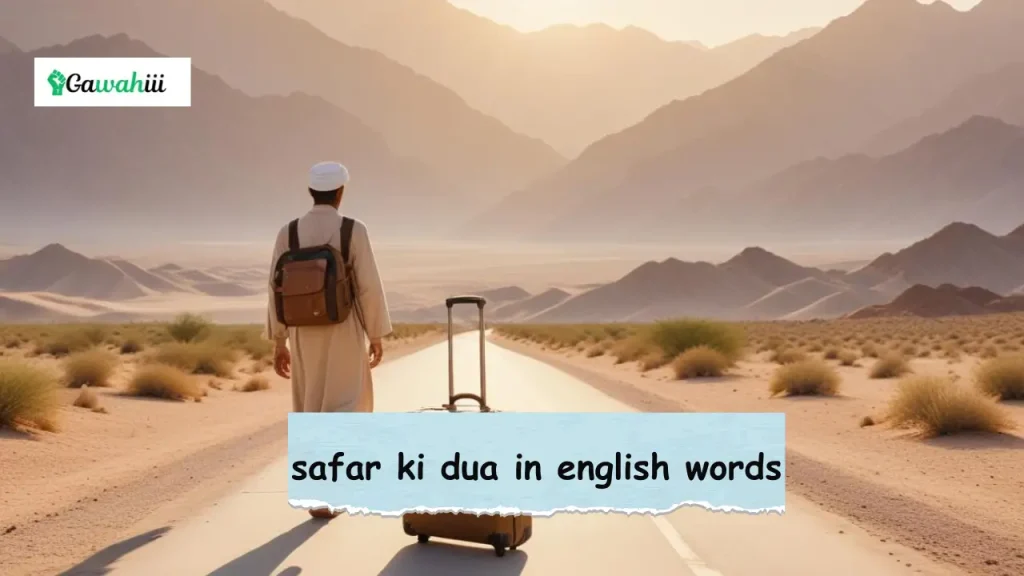Introduction:
Safar ki dua in English words Isn’t there something very thrilling about making a journey? Travel can either mean taking a short trip to see your family or an adventure cross-country or to a new country; either way, travel sets one free. We pack our suitcases, we set our directions, and we fantasize about what is going to happen. However, in all the hustle and bustle, there is one step that is the most important and powerful, yet extremely peaceful, and this step is Safar Ki Dua.
What on earth is Safar Ki Dua in the English language? You may be admitting. Basically, it is the traveler prayer, which is a sweeping supplication (dua) offered by Muslims prior to going on any voyage with something beautiful as a prayer. It is a form of placing ourselves in the hands of Allah (SWT) in honestly seeking his protection, blessings, and guidance in whatever adventures we face. This is not just a mere formality but rather a deep step of faith that brings peace, gives less stress, and ends the whole trip on a good note.
Today, we are going to take a deep dive into the Safar Ki Dua, what it is, what enormous benefits it has, and how you can add it to your own travel routine in the easiest way possible. Ok, then, buckle up, and here we come to this important part of a blessed journey!
What Makes Safar Ki Dua Such an Important Traveler?
Put yourself in a situation of going for a trip without checking your tires, fuel, and navigation. You would not, would you? It is also the same story with Safar Ki Dua because we are so spiritually prepared for the road we are to take. It is a recognition that we plan our work, but still, the entire event is within the premises of the Almighty.
The following are only a few reasons why this dua is so important:
- In Search of Divine Protection: Things around the world are uncertain at times. Misfortunes, unexpected sudden appearances, or illnesses can occur. Through the Safar Ki Dua, we are proactively safeguarding ourselves against all the problems and troubles, both visible and invisible, by the grace of Allah. It becomes as though we are surrounded by a shield of God.
- Making Blessings: even the journeys, whether little or big, could bring blessings. It may be to meet with loved ones, attain new experiences, or even to perform a religious duty such as the Hajj or Umrah; the dua will allow us to welcome Allah into our journeys to make them more productive and satisfying.
- Reduced Stress: At times, travelling may be stressful. Concerns about being on time, logistics, or going to new environments are normal. The feeling of inner peace and tranquility is felt when you say this dua, and you are fully aware that you have placed your faith in the one who can guide all matters. It relaxes the heart and the mind.
- Satisfaction of a Sunnah: The Prophet Muhammad (peace be upon him) even used certain words of supplication before traveling himself. Tracing him by following his practice (Sunnah) is a great reward in itself, and it takes us nearer to him.
- Call to Remember the Dependence on Allah: We lead busy lives, and we sometimes fool ourselves into believing that we are self-sufficient. Travel in a notable way reminds us of our weaknesses and how we are vulnerable and how we need some greater power. The Safar Ki Dua is a very nice reassurance that we can never have enough of the grace and mercy of Allah.
English Words (and Arabic Transliteration) of the Safar Ki Dua
Now, to the point: the very Safar Ki Dua itself. Although the recitation when performed in Arabic is desirable at all times due to the extreme and amazing spiritual effects that come with it, it is important to read its meaning in English to comprehend the essence of it.
The most popular Safar Ki Dua is given below:
Arabic:
Glory to Him who gave us this, and we would never be able to thank Him enough, and surely we are turning back to our Rab.
Transliteration:
Subhanallazi shikhara lana hadha wama kunna lahu muqrineen wa inna ila Rabbina lamunqaliboon.
The English words of Safar Ki Dua (meaning):
Praise be to him who has made this (transport) subservient to us, and we could never have had it within our reach. And with our Lord are we returning.”
Another Glance at the Meaning:
Allah be praised, Who has made this (transport) subdued to us…” The first phrase is a great recognition of the greatness and the altruism of Allah. We understand that it is not because of our strength and intelligence that we can travel either by road, air, train, or on foot, but it is given to us by the Almighty. These modes of transport have been made subservient at his behest.
…we never could have had it in our power…: This is what shows our humbleness and contingency on Allah. In the absence of His will and His creation, we will have no means or ability to make such journals. It serves as a reminder that whatever we have and have accomplished is all because of Him.
To our Lord, we are returning, surely.” This is probably the deepest section of the dua. It acts as a great reminder of our final destination and destiny in life. All paths in this world are transitional, and our real permanent path is towards Allah. This saying enables us to put things into perspective by keeping our worldly journeys within the greater scope of our spiritual journey. It promotes mental awareness and responsibility and makes it clear to us that we will all go back to him someday to face judgment on our actions.
Other Duas to Travel
Although the primary Safar Ki Dua is the most important, it is possible to make additional beautiful supplications of the Sunnah, which you can use in addition to the main Safar Ki Dua, complementing it and developing your spiritual preparation to travel further.
In the case of Leaving Home:
Arabic: Bismi Allah ta ala Allah la Hawla Walaa Kwata illa Billah
Transliteration: Bismillahi Tawakkaltu Ala Allahi, La Hawla Wa La Quwwata illa billah.
English translation: (With the help of Allah, I believe in Allah). We have strength neither in might nor in power but with Allah. Reported by Tirmidhi)
When you arrive at the place:
Arabic: اللَّlivernasupine organizers comhelli growler hazard Allah Wa-innaa aAuzu bika mina sharrishaa wa sharpish-sh-sh- Thaar one lunettes bamboo eller digginsen bikam wazalla hathallajl 1 smilesnbs Co the Supreme Hazard and the Supreme of the Folks and the Supreme of the Folk at the time?
Transliteration: Allahumma inni Allahu bika min sharriha wa sharri ahliha wa sharri hayatha.
Angelic means: “O Allah, I take refuge with Thee against its ill, against the ill of its people, and against the ill of that which is therein.” According to An-Nasai (reported)
Regarding Staying in a Place (e.g., hotel, relative’s house):
Arabic: A ceiling to rafters window drapes, a courier, an evening newspaper, a kitchen sink, upside down, an evil of that which Thou hast created (Uthmania al-Lailah)
Transliterated: Auddhibi kalimatillahit-tammaati min sharri ma khalaqa.
Translation: I take refuge in the most perfect words of Allah against the evil of that which he has created. (Muslim reports it)
All these extra duas offer a complete package of seeking the blessings and safety of Allah in every journey aspect of yours, i.e., not only at the starting point but also at the destination and even when you are staying.
The time and the method of recitation of the Safar Ki Dua
What is so beautiful about Safar Ki Dua is that it is simple and flexible. It does not require a heavy ritual, just a well-meaning.
The time of reciting:
- Ideally, when you are about to leave: As you enter your car, get on to a plane, or board your walk, take a minute to repeat the dua. It is most of the time recommended and popular.
- At any moment of the journey, in case you forget to recite it at the very beginning, do not worry! You can always repeat it whenever it reminds you of the same, as long as you are on your way somewhere. What really counts is the intent.
- On passing a big landmark, individuals enjoy reciting it as they pass an urban boundary, a border, or any other major point in their trip.
Saying How:
- Intention: Have your heart earnestly intend to own the protection and blessings of the journey of Allah.
- Bismillah: Start by reciting the following: Bismillahir Rahmanir Raheem (In the name of Allah, the most gracious, the most merciful).
- Recite the Du: Recite Safar Ki Du aloud and intelligently.
- Other Optional but Recommended Duas: You can also make the dua of any of the other travel duas listed above besides the dua of leaving home.
- Supplicate: Repairing, you may then raise your hands and pronounce whatever personal supplications you wish to have regarding your journey. –may you be kept safe and easy, and have the whole of it turn out to your advantage, and may your travels afford you no evil consequences.
- Sincerity and mindfulness are the point. It is not on the uttering of the words but really on internalizing the meanings and putting your trust in Allah.
Islamic Sources: The Travel Sunnah Duas
The Saudi travel and Safar kitab Safar Ki Dua and other prayers in this realm are strongly established in the Sunna (practices and teachings) of Prophet Muhammad (PBUH). These reports of the Hadith confirm the value and blessings of these duas.
The Main Safar Ki Dua:
According to one of the Hadiths by Ibn Umar (RA), he (the Messenger of Allah (PBUH)) used to say “Allahu Akbar” three times when he used to mount his camel to travel and then recite: “Subhanalladhi shikhara lana hadha wama kunna lahu murine wa inna ila Rabbina lamunqaliboon…” (Muslim)
This goes a long way in demonstrating the behavior of the Prophet, and it is a direct teaching to us.
Dua to go out of the house:
The Messenger of Allah (PBUH) said, “Whoever says (when he goes out of his house), ‘Bismillahi, tawakkaltu ‘alallahi, la hawla wa la quwwata illa billah’ (In the Name of Allah, I have relied upon Allah, there is neither might nor power except with Allah), he will be told, ‘You have been made sufficient.’ He will make him safe and will guide him…” (Reported by Anas bin Malik (RA)). Satan also will turn devotees against him.” (Tirmidhi)
This Hadith pinpoints how great the protection and guidance of reciting this very easy dua is when one exits the house.
These are only some of the examples of how these duas are not the ones made up but rather a fixed tradition that began in the life of the Prophet (PBUH) and which leads us to a more diligent and secure mode of traveling.
How to Incorporate Safar Ki Dua in Your Life
It is not that difficult to make Safar Ki Dua a habit. The following are some of the practical tips:
- Set yourself a reminder: If you forget easily, then always set a mental note or a little reminder on your phone that says travel dua every time you want to go somewhere on a trip.
- Teach Your Family: Ask your children and the other members of your family to memorize and recite the dua before their trip. It teaches good Islamic practice to young people.
- Listen: You can watch recitations of the Safar Ki Dua hundreds of times, and by listening to it in the most beautiful ways, you are likely to memorize it and learn habitually to pronounce it.
- Keep a Small Dua Card: A small card of the Arabic text, transliterated and with the English meaning, is sometimes useful to those who travel a lot.
Just by reciting this lovely prayer, as you always make it a point of implementing these motivating words, you will see for yourself that you will be following the sunnah and the active presence of peace, protection, and blessings on all journeys.
FAQs About Safar Ki Dua
Some of the commonly asked questions on Safar Ki Dua are the following:
Is Safar Ki Dua applicable on long trips, or can it also be recited on short journeys?
No, Safar Ki Dua can be used in any journey, no matter how long it is. Whether you are merely driving to the grocery store, going somewhere to work, or going on a journey to the other end of the Earth, it is highly advisable to recite it. The sense is to find habit protection and the blessing of Allah wherever you do not like your habit to get somewhere, somewhere regarding staying in the habit.
But what happens when I forget to recite the Safar Ki Dua, the commencement of my journey?
In case you forget, it does not matter! It is preferable to say it now and then as you travel in the car rather than not at all. The meaning of the attempt to get the protection of Allah is intact. Just say what you think about it right away.
Is it possible to play Safar Ki Dua by women?
Absolutely! Safar Ki Dua is all-inclusive, i.e., among men, women, and children. Recital of this or, indeed, any supplication in Islam is not gender limited.
Do I have to perform Wudu (ablution) to recite Safar Ki Dua?
No, you do not require having Wudu to recite Safar Ki Dua or any other non-Quranic dua. Although being in a state of Wudu is always spiritually appropriate, it is not a requirement of personal duas.
Does this dua have any symptoms or positions?
No, there are no definite conditions and postures. You may say Safar Ki Dua quite anywhere: sitting or standing, walking or even lying down. The main point of it all is to say it seriously and concentrate on what it means.
Are the non-Muslims in a position to use the Safar Ki Dua?
Although the Safar Ki Dua is an Islamic prayer that contains Islamic beliefs and Islamic teachings, it can also be viewed by all as a universal prayer because it speaks of universal aspects of seeking protection and blessings on a journey. Non-Muslims may contemplate the English words “in,” “case,” “comfort,” “meaning,” “into,” or “meaning out of them.” To a Muslim, however, it is a pronouncement of worship and faith in Allah.
Conclusion:
Travel is a present, a chance to experience, education, and change. When you take the Safar Ki Dua in English words (and its Arabic original) as part of your pre-travel ritual, you are not just speaking the words, but rather you have taken part in a very strong act of faith where you have handed the journey to the One in full control of all the affairs. You include peace, impending shelter, and a multitude of blessings in your trip and convert your physical journeys to spiritual journeys.
Therefore, whenever you are planning to go out, whether on a small or a great adventure, pause, think, and chant the Safar Ki Dua. It is my wish that all your trips are going to be safe, blessed, and memorable.







